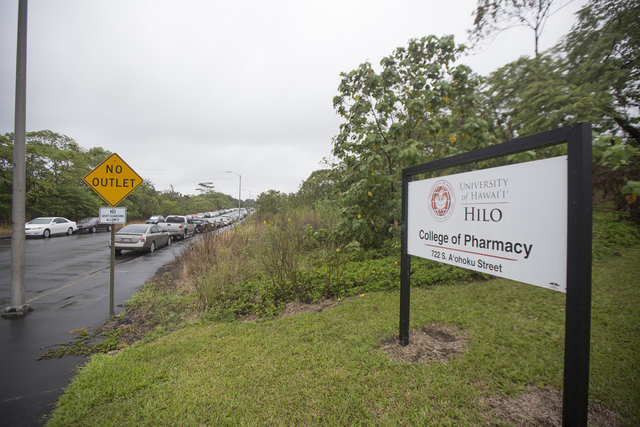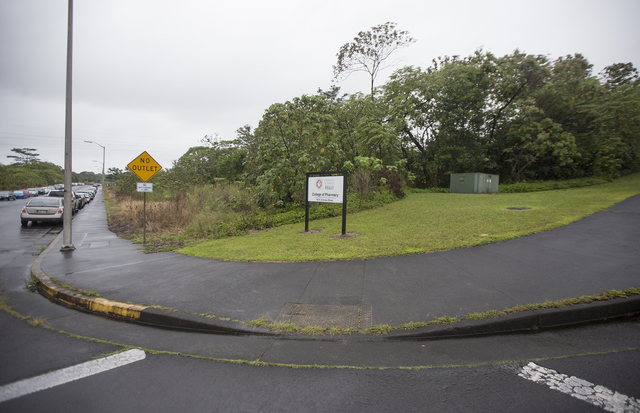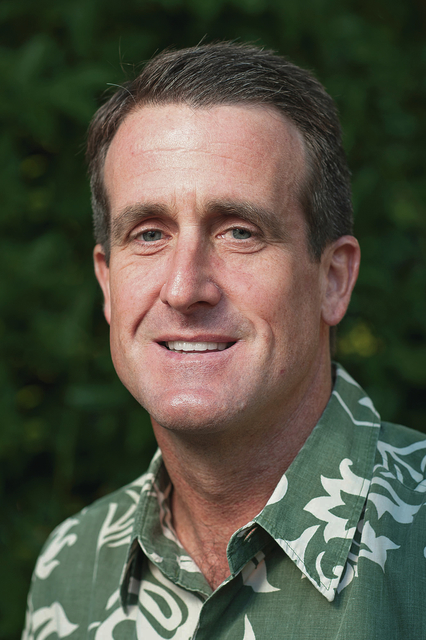It’s been nearly 16 months since students and staff gathered for a formal groundbreaking of the Daniel K. Inouye College of Pharmacy’s long-awaited permanent building. But since then, little at the South Ahoku Street construction site has changed. ADVERTISING It’s
It’s been nearly 16 months since students and staff gathered for a formal groundbreaking of the Daniel K. Inouye College of Pharmacy’s long-awaited permanent building. But since then, little at the South Ahoku Street construction site has changed.
The plot at the University of Hawaii at Hilo remains vacant and grown over with weeds. Pharmacy students still attend most classes in a cluster of portable buildings a few hundred yards away. And some are getting frustrated.
“(I was) told at (my interview in 2013) that there would be a permanent building built by 2017,” said a second-year UH-Hilo pharmacy student who requested anonymity because of fear of retribution. “The plans were drawn and the building was beautiful. Since I was accepted and became a student, the plans for the building have changed … I would love to have a new building, but I know that I will never see it.”
The college, which opened in 2007 as the first pharmacy program in Hawaii, has operated out of five temporary sites while the university drafted plans and worked to secure funding for a permanent building.
For years — even when declared the system’s No. 1 capital improvement priority at one point — the project failed to get funded. Officials say that’s in part because of penny-pinching times during the Great Recession. The project’s budget since was scaled back dramatically — currently, it’s $30 million.
In 2013, the college’s former dean, John Pezzuto, worried that if the school couldn’t show progress on the permanent building, the program could lose accreditation by the Accreditation Council for Pharmacy Education.
In 2014, proponents were thrilled when lawmakers finally authorized $33 million for the project, including $28 million in general obligation bonds and $5 million that would be generated by UH.
But there were still kinks to iron out — UH had to raise $5 million before work could begin.
The December 2014 groundbreaking, publicized with photos of university and government officials posing on-site with shovels in the dirt, was meant to be ceremonial rather than signify the actual start of construction, UH spokesman Dan Meisenzahl said, and “happened maybe a little more ahead of schedule.”
“It was to demonstrate to the accreditors that we were serious about building a single location for the school itself and had the commitment of state leaders,” he said, adding accreditors have “been kept up to date every step of the way” and “don’t have any issues” with the delays.
The project didn’t actually go out to bid until November 2015, nearly a year after that groundbreaking. Bids came back early this year, and they were all over budget. Meisenzahl said the lowest bid was about $2.5 million too high.
The $33 million includes $3 million for potential cost overruns required in case “something comes up unexpected,” he said.
UH officials are mulling Plan B options. The system must commit the funds by the end of the fiscal year in July, or the appropriation will lapse. Meisenzahl said the university is weighing a handful of options and plans to have more answers in the coming weeks.
“We had to go back and re-evaluate what to do next,” he said. “It’s either, put it back out to bid and see if (bids) come in closer to the bid amount of $30 million, re-scope the project or get private funding and raise the difference ourselves, or a combination of two or all three.”
The college “shares … frustration” with students, he added, and the project remains “top priority” for the university.
“Despite the fact that we wish this was already built, it will get built,” Meisenzahl said. “It has to happen sooner than later, and it should have already happened … it’s going to proceed. The devil is in the details.”
Email Kirsten Johnson at kjohnson@hawaiitribune-herald.com.





